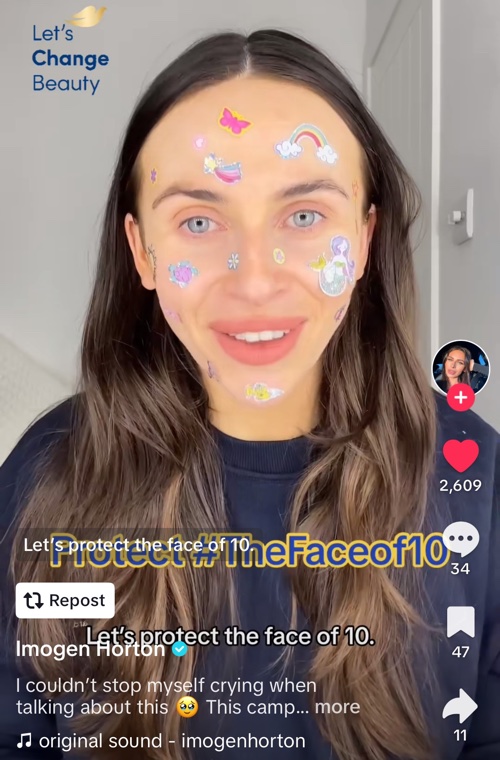Dove has entered the conversation about girls being exposed to adult skin care content, and now the positive beauty brand has revealed why.
The Unilever brand, which has a history of promoting self-esteem among young women, recently launched its #TheFaceof10 campaign.
The TikTok initiative brings together academic experts, dermatologists, creators and body confidence advocates to highlight the absurdity of children feeling pressured to adopt unnecessary anti-ageing skin care regimens.
Supporters include actress and talk show host Drew Barrymore, who has added her voice to the message that skin care “should always be pro-age and age appropriate”.
It features decorated faces representing #TheFaceof10, highlighting what Dove says childrens’ faces should be covered with – glitter, stickers and face paint – as opposed to inappropriate anti-ageing skin care ingredients.
Dove’s move follows the controversy surrounding ‘Sephora kids’, which took over social media at the beginning of the year.
Shoppers flooded to TikTok to complain about the popular beauty retailer being inundated with Gen Alpha, buying products from buzzy beauty brands including Byoma, Drunk Elephant, Glow Recipe and Sol De Janeiro.
“We have seen that, recently, young girls are being exposed to adult targeted anti-ageing content; nearly one in two young girls, aged 10 to 17 years old, are expected to worry more about their appearance as they age,” Firdaous El Honsali, Global Vice President, Dove Masterbrand, told Cosmetics Business.
“We’re seeing young girls adding products designed for adults to their wish lists and skin care regimens, without understanding the possible consequences for their physical and mental health.”
She added: “Gen Alpha are increasingly exposed to adult targeted skin care content on social media.
“Our social listening showed us that at first they are not even looking for anti-ageing products, they want the shiny, bright coloured packs but end up buying products that are completely unsuitable for them and getting into a cycle of anti-ageing skin care.”
According to El Honsali, this exposure results in anxiety around appearance and the prospect of ageing.

TikToker Imogen Horton in support of Dove’s #TheFaceof10 campaign
In a two-pronged approach to tackling the issue, Dove teamed up with Dr Phillippa Diedrichs, Research Psychologist at the Centre of Appearance Research at the University of West England, and body image expert and certified dermatologist Dr Marisa Garshick on a free resource on how to talk to young people about anti-ageing and beauty anxiety.
Called ‘The Gen A Anti-Ageing Talk’, it is now pinned to Dove’s TikTok channel for all parents and caregivers.
Speaking with Cosmetics Business, Garshick recommended those with young skin consider a basic routine that incorporates a cleanser, sunscreen and moisturiser.
Not only are anti-ageing ingredients like retinol and exfoliating acids not needed for young skin, she said, “they can also lead to skin sensitivity and irritation as they can disrupt the skin barrier”.
“In some cases, a retinoid or salicylic acid, a type of exfoliating acid may be considered for those with acne, but should always first be discussed with a board-certified dermatologist.”
Dove’s El Honsali is now encouraging competitors to get involved, either by joining it to raise awareness of the impact on self-esteem, or by providing expert tips and tools to help children navigate what is suitable for them.
